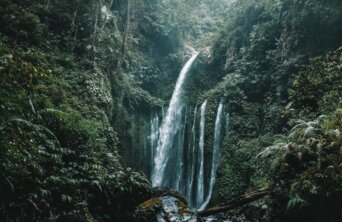- About
- Topics
- Picks
- Audio
- Story
- In-Depth
- Opinion
- News
- Donate
-
Signup for our newsletterOur Editors' Best Picks.Send
Read, Debate: Engage.

| topic: | Sustainable Development |
|---|---|
| located: | Indonesia |
| editor: | Leo Galuh |
Every Friday afternoon, hundreds of volunteers from different backgrounds, including youth groups, various social groups, the Balinese local government, and even businesses, gather at one of the many rivers in Denpasar, Bali island. These volunteers, organised by the environmental NGO Sungai Watch, come together to clean the rivers that are in desperate need of attention.
Though Bali Island is well known globally for its beauty and is commonly referred to as the ‘Island of Gods,’ the island is dealing with significant waste management issues that have left its rivers polluted and waters undrinkable. Plastic and debris accumulate in the rivers, inevitably ending up in the ocean and endangering marine ecology. The filthy river water spreads down estuaries and wreaks havoc on the local community’s rice fields.
Sungai Watch, founded in 2020 by Kelly Bencheghib and her brothers Gary and Sam, instals floating garbage barriers to collect rubbish. The organisation also educates and engages the local community on the benefits of floating trash barriers and keeping the waterways clean.
Meanwhile, another popular tourist destination in the country, Bandung, the capital of Indonesia's West Java Province, is also facing a similar waste management issue. Cikapundung river has a total length of 28 kilometres that flows through the city of Bandung. However, if tourists want to observe it beyond the Asia-Africa Conference Monument, this river is contaminated, full of plastic debris and toxic substances.
The Bandung city government has to pick up at least 13 tonnes of waste from the Cikapundung river every day, according to Bandung’s Water Resources agency Didi Ruswandi. In 1960, the water in the Cikapundung river was drinkable and was widely used by the local community for household purposes such as dishwashing and laundry. Today, people who live near the Cikapundung River complain about the effects of river water pollution, such as waste, poor water quality and declining fish population, among other consequences.
Therefore, a group of people who live near Cikapundung river educates the community about the importance of protecting the environment through Tarawangsa musical art performance. This traditional agrarian art from West Java was chosen because it has a relationship to environmental sustainability: Tarawangsa is frequently used in ceremonies to express gratitude to God before and after the rice harvest, which is strongly dependent on the sun.
Local arts and cultural performances were chosen to help amplify lessons about environmental preservation to the public. It is intended that this activity would also introduce and preserve culture, as well as enhance the local economy. The greater the public participation in Tarawangsa musical performances, the more hope there is for waterway sustainability, particularly for the Cikapundung river.
Apart from spreading awareness of the importance of environmental preservation, these performances are also intended to spread and preserve culture, as well as enhance the local economy. By tapping into the imaginations and sense of respect of the community, the initiative hopes to protect the Cikapundung river and other Indonesian waterways.
Image by Benjamin Janos